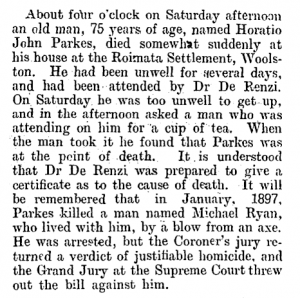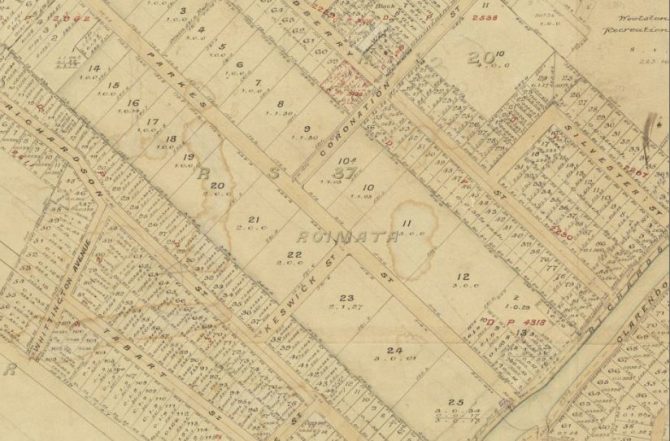The burial card, held at Tūranga, opens a new window in our church register index, for Horatio John Parkes is slim on detail; he was buried on 27 June 1898 aged 75. His usual residence was Opawa and his occupation was gentleman.
Death and funeral notices from PapersPast, opens a new window shed more light - Horatio was the cousin of the highly contentious Sir Harry Smith Parkes, a diplomat and Queen Victoria's man in China and Japan. Horatio lived on River Road, Roimata Settlement and on death was bound for Woolston Cemetery.
Further newspaper articles spill the tea - Horatio J Parkes was a notorious killer! Horatio handed himself into police in January 1897 after killing Michael Ryan, opens a new window. Ryan had been living with the elderly Horatio Parkes and was fond of a drink. Ryan came home drunk in the early hours of 22 January. Woken up, Horatio scolded Ryan and was then attacked. Parkes used an axe to defend himself and inflicted two fatal blows to the younger man. The Lyttelton Times provided extensive coverage of the crime, even including a floor plan of Horatio's modest abode, the scene of the grisly crime.
Horatio was described in many reports as a "remittance man", a word not used today but which had currency in the colonial period. A remittance man was basically a middle or upper class sponger, often the black sheep of a family paid to stay away and keep the family name unsullied by scandal. Horatio does not seem to have been a remittance man in the classic sense. There is no evidence of significant criminal activity either in England or in Canterbury (just a bit of drunkenness and non-licensing of his dogs).
So who was Horatio?
Born 22 May 1826, Horatio was baptised the following year at St Phillip's Cathedral, Birmingham, England. His parents were Lieutenant John Parkes of the Royal Navy and Mary Ann née Saunders. An only son (with five sisters) Horatio's family were joined in 1833 by their three orphaned cousins Harry, Catherine and Isabella Parkes. Both Horatio and his cousin Harry were sent to boarding school at Balsall Heath, Birmingham. In 1837 Horatio's father John died and the family's finances became, according to Sir Harry's biographer, "straitened". The boys were moved to King Edward VI's school at Edgbaston.
In 1838 Horatio's oldest cousins Catherine and Isabella were offered a home with a distant relative in China, and Harry followed in 1841. Horatio's mother died at Maddox Street, Hanover Square, London in 1846 but is buried with her husband at St Paul, Birmingham.
Early in 1850 Horatio was working as a chemist in Islington but later in the year he was on his way to New Zealand. Horatio acted as assistant to the surgeon on the Sir George Seymour and arrived in Lyttelton on 17 December 1850. In January 1851 he wrote to John Robert Godley, opens a new window respectfully asking for the £10 payment due to him for this assistance.
His cousin Harry, who was doing extremely well for himself in China, had purchased a town section in Lyttelton and rural section 37 on the banks of the Heathcote, opens a new window in present day Woolston (land now under MacKenzie Avenue). Horatio lived here in a "3 roomed cottage on 2 or 3 acres of land", as well as a variety of tenants and leasees.
Initially Horatio seems to have dabbled in business, mainly as a commission agent or farmer but latterly he was described as "out of business" in electoral rolls and as a labourer in the Police Gazette after his arrest. It was said in newspaper reports during the trial that Horatio received £5 a month which he collected from his solicitor T S Weston, opens a new window. One witness during Michael Ryan's inquest described Horatio as "intelligent and courteous man but weak and foolish". He never married and seemingly lived a quiet life of anonymity.
That ceased with the bloody death of Michael Ryan. Horatio was charged with homicide on 23 January. Extensive coverage followed in the New Zealand newspapers.
On Monday 15 February 1897 Horatio appeared in front of His Honour Mr Justice Denniston, who advised the jury, opens a new window that they could throw out the charge given that Ryan had terrorised, then attacked Horatio. The next day Horatio was released without charge.
Harry Parkes' fifty acres at Woolston, and Horatio's home, had been purchased by the government, opens a new window in 1895 for the Roimata Settlement. Horatio continued living there until his death in 1898.
Sir Harry, who had died in 1885, opens a new window, left no money for Horatio although he did leave bequests for some of Horatio's sisters and his own sisters (Catherine and Isabella Parkes both married Christian missionaries to China). Perhaps Harry considered he had done enough for his less able cousin.
One lasting legacy was the naming of Parkes Street, opens a new window (more likely in honour of Harry who probably never set foot in New Zealand, rather than poor Horatio). The name lasted until 1926 when it was renamed MacKenzie Avenue.
More
- Horatio John Parkes entry in Macdonald Dictionary
- A poor remittance - the life and times of Horatio Parkes
- Meet the locals posts





Add a comment to: Meet the locals – Horatio John Parkes, remittance man and killer